
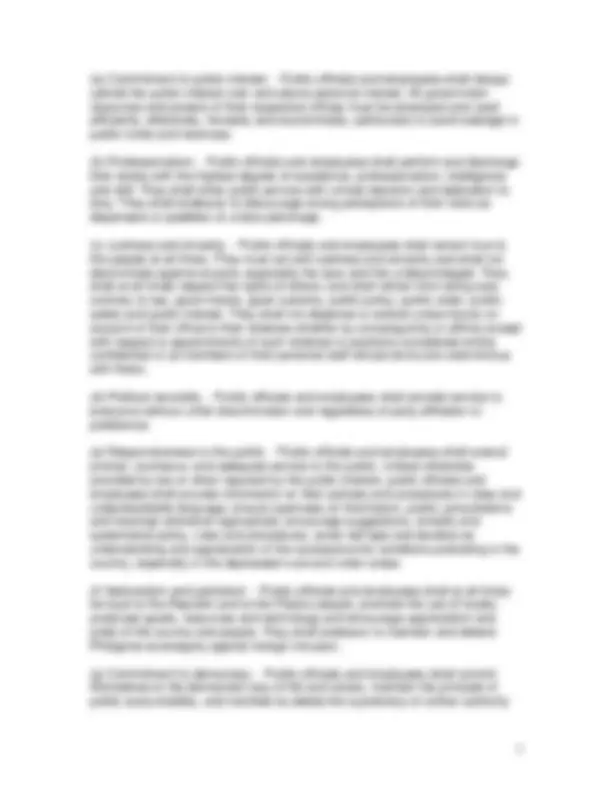
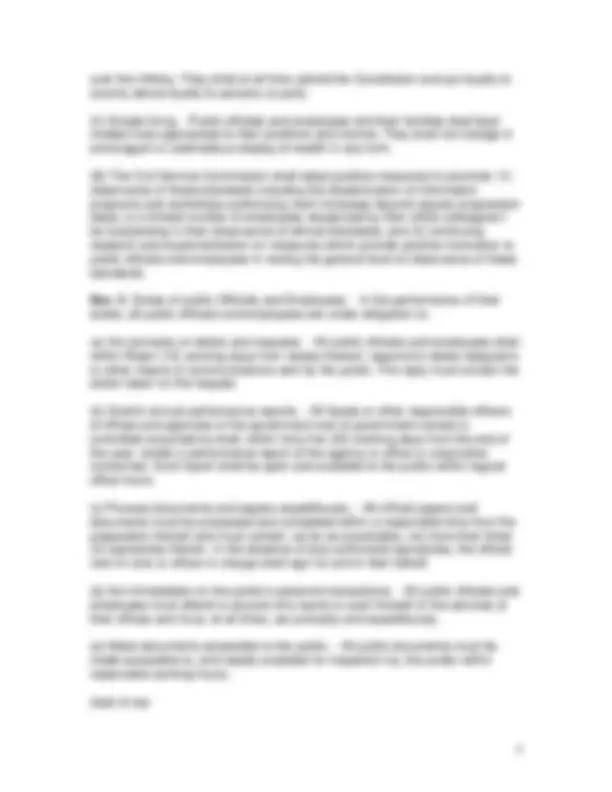
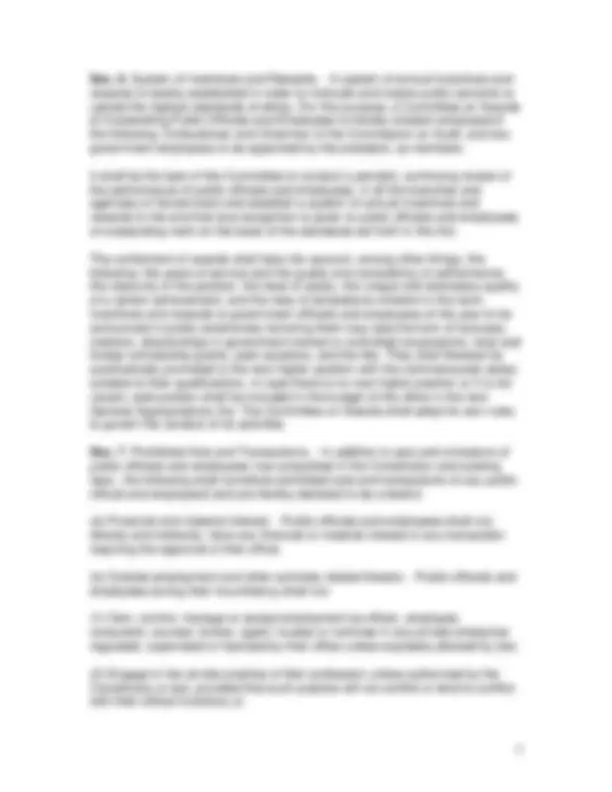
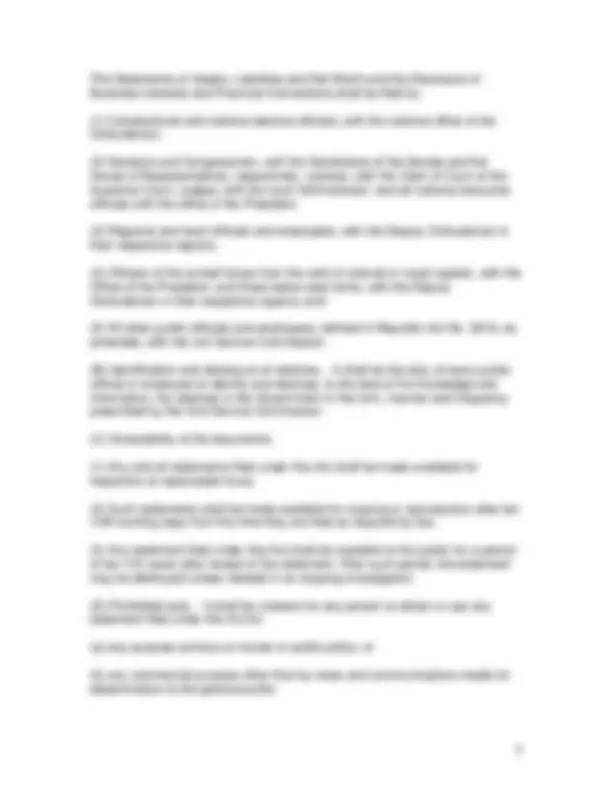
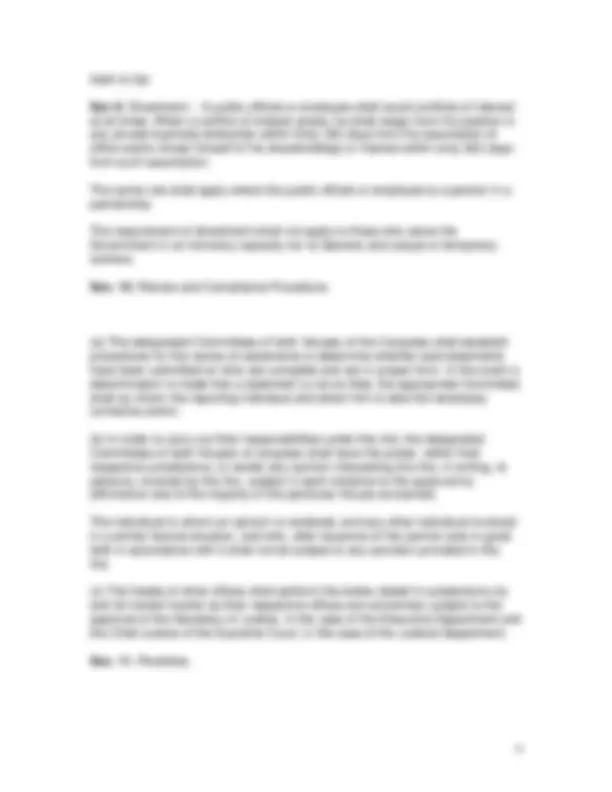
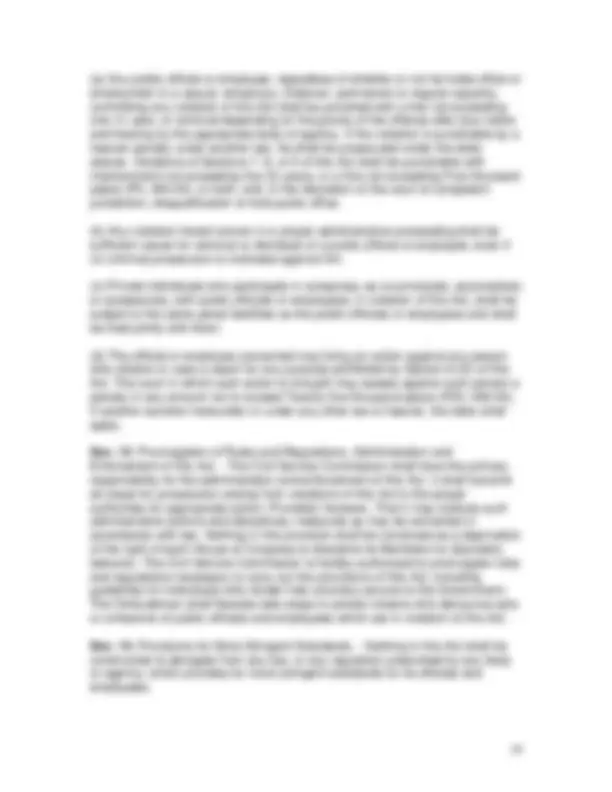
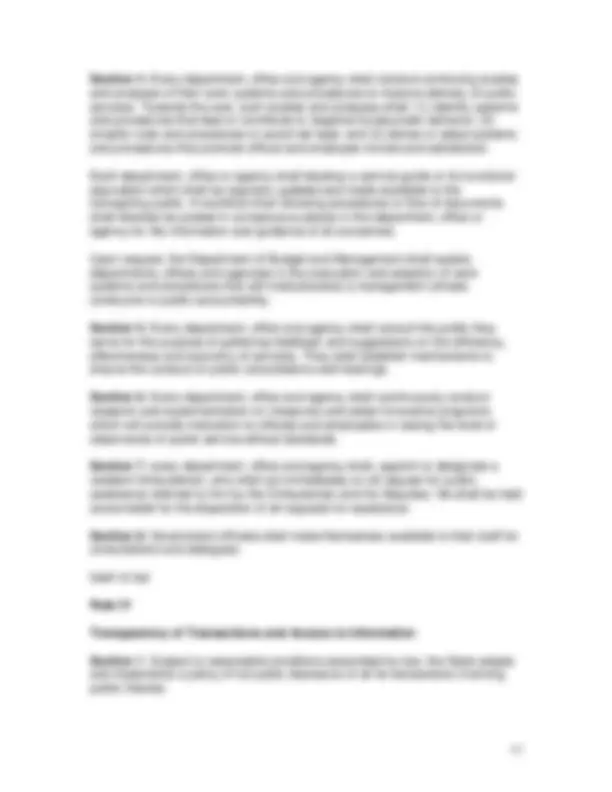
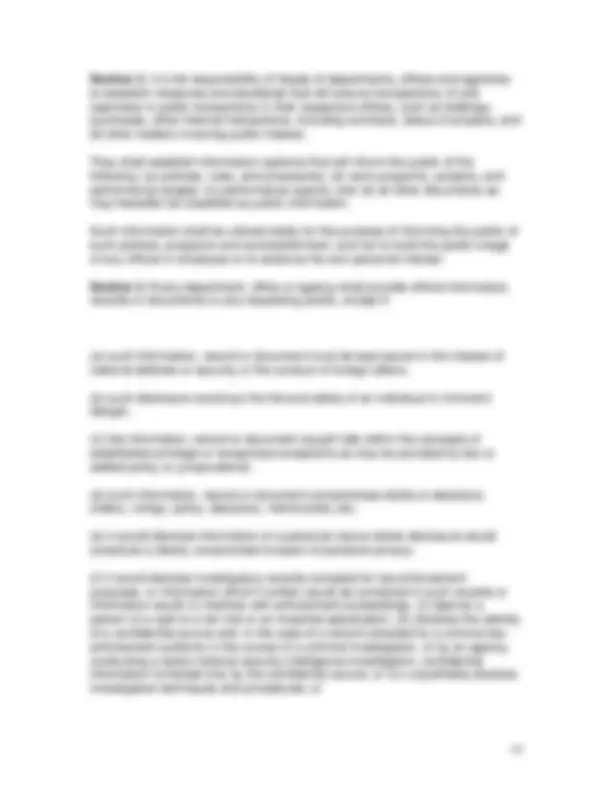
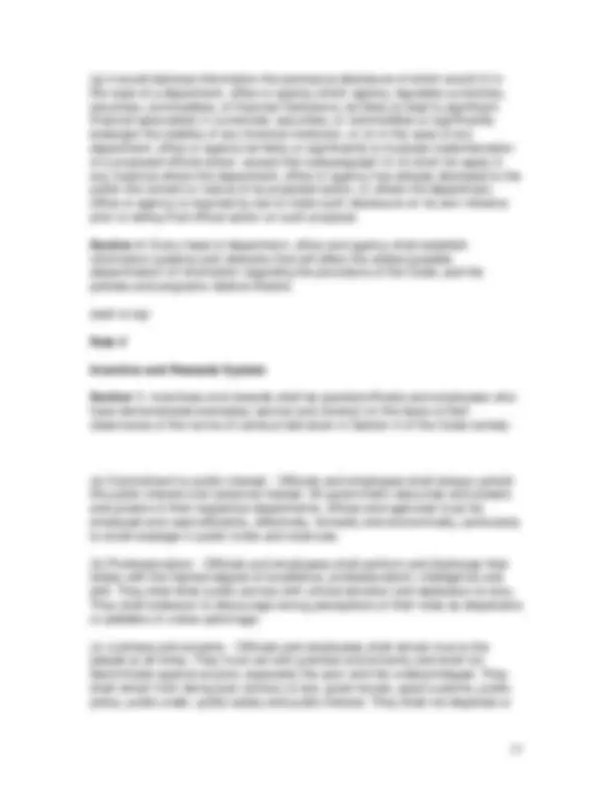
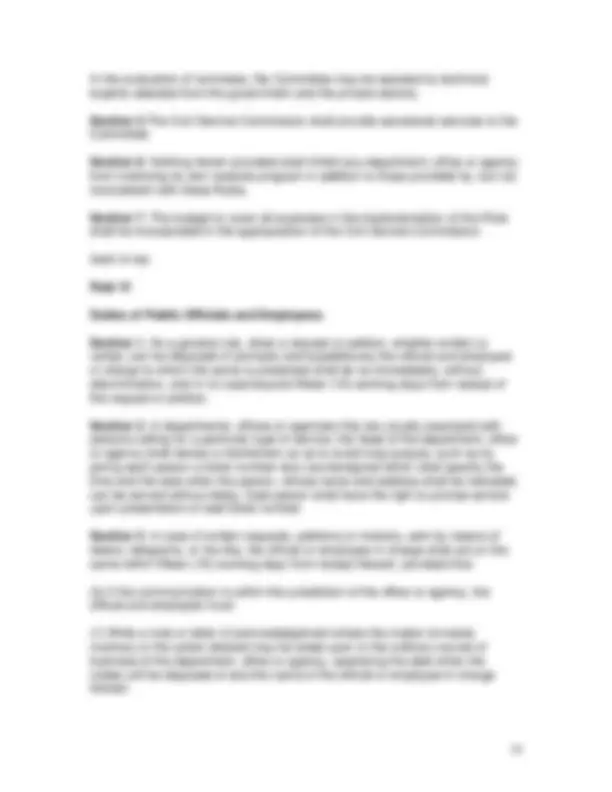
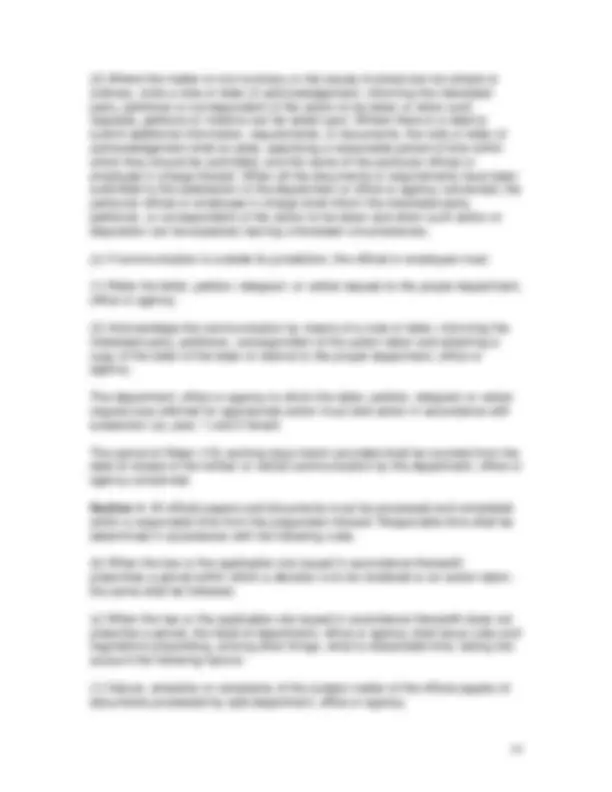
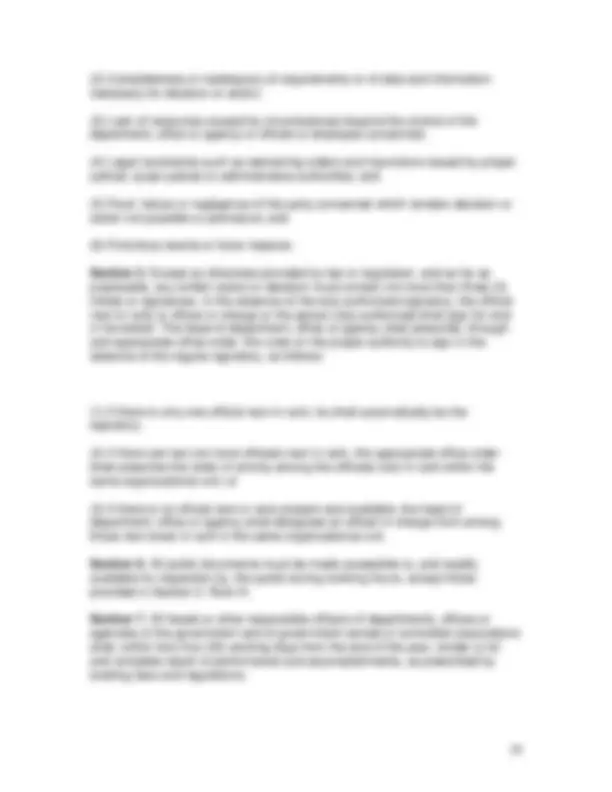
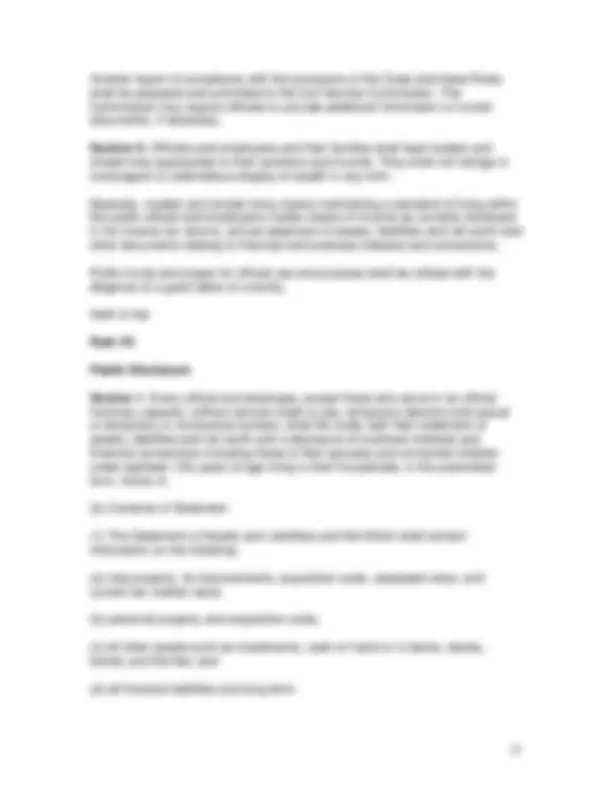
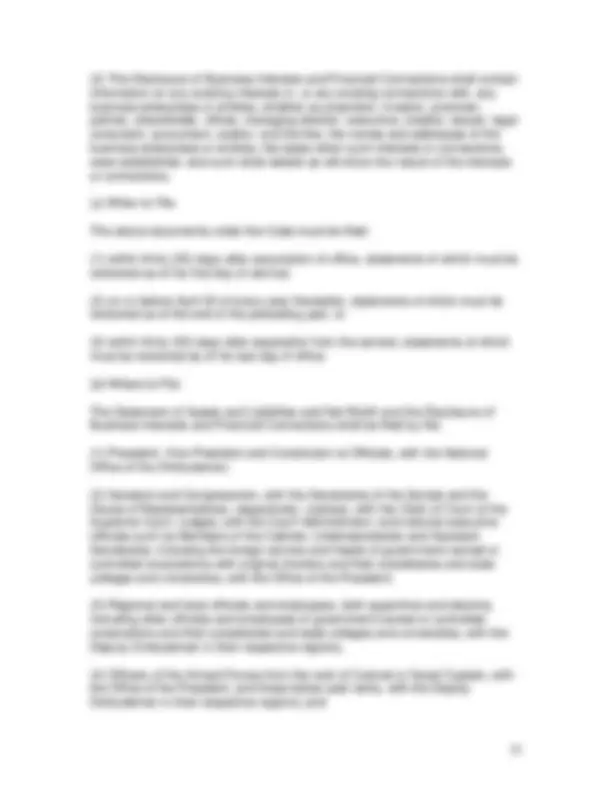
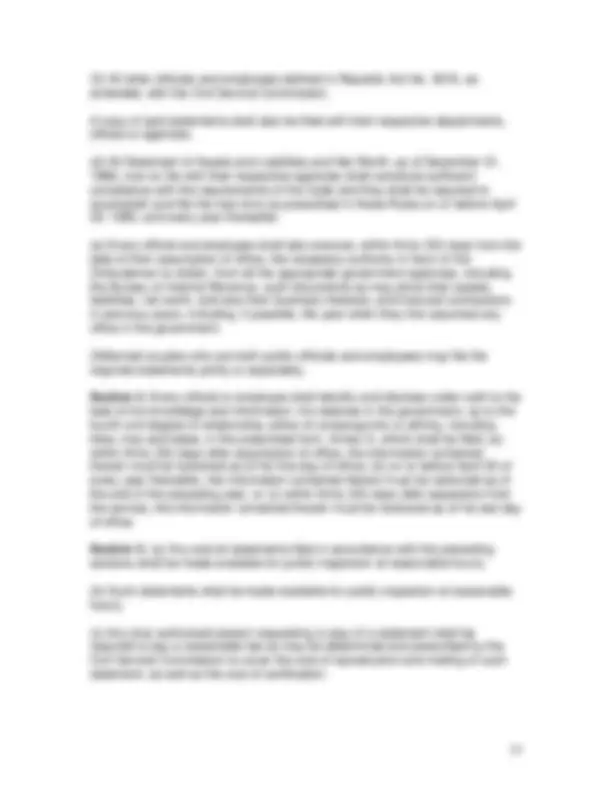
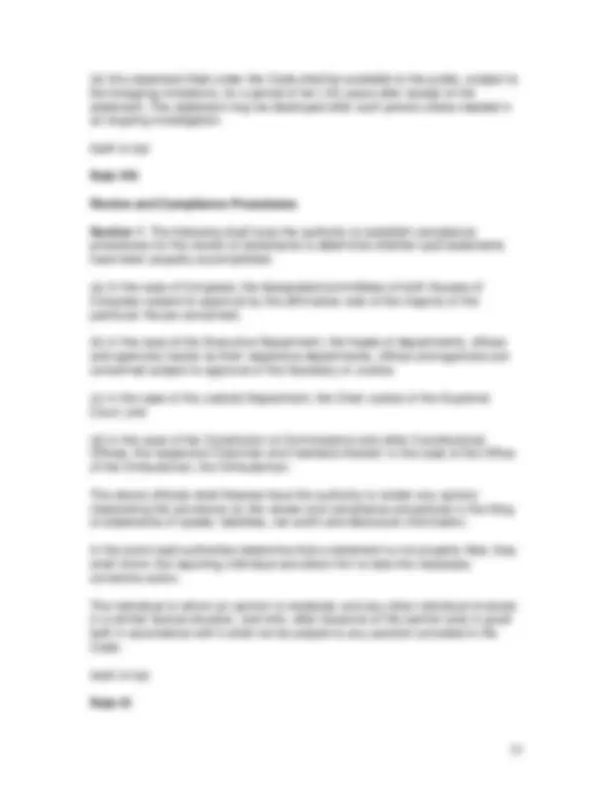
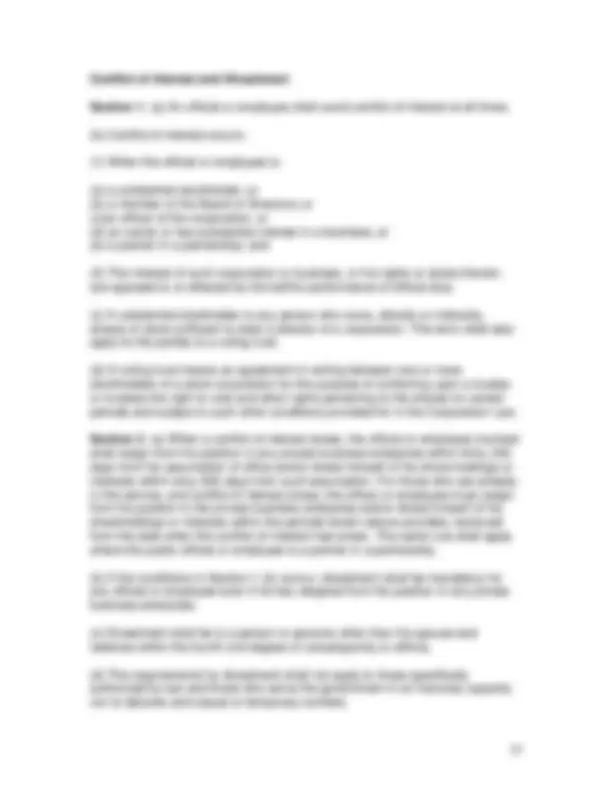
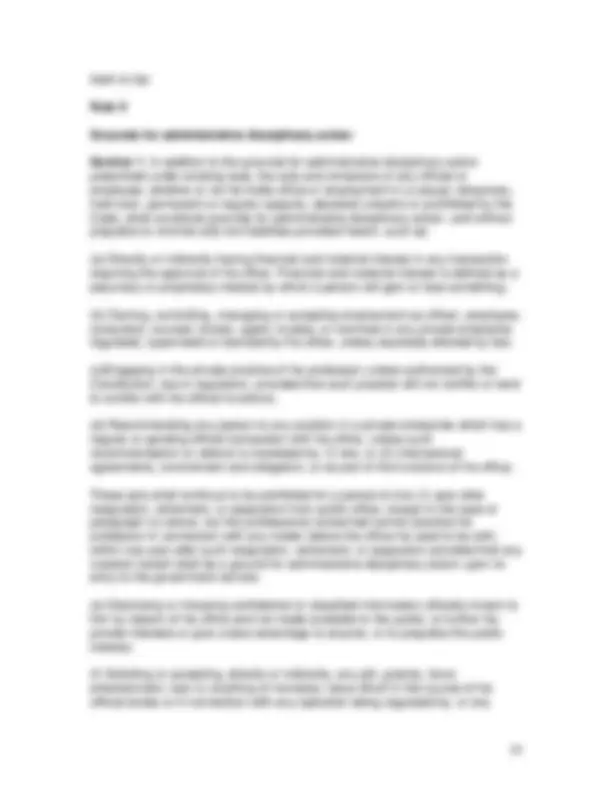
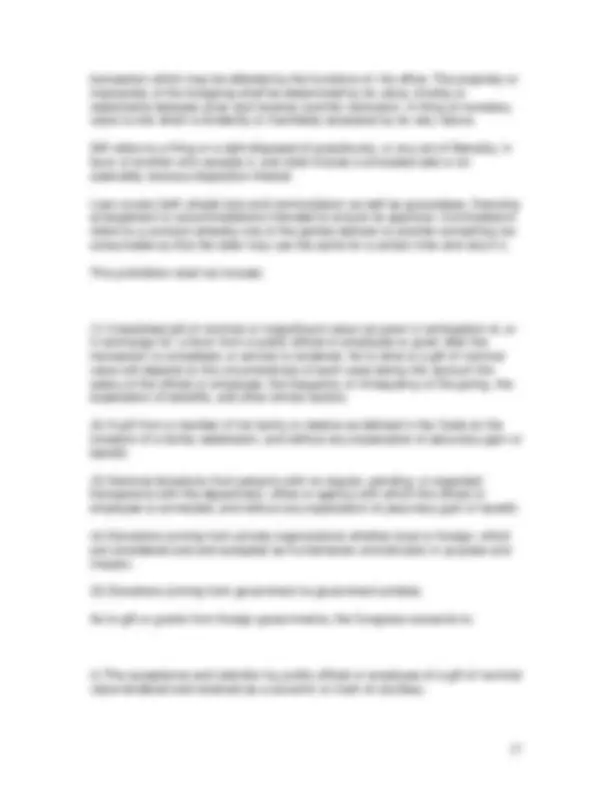
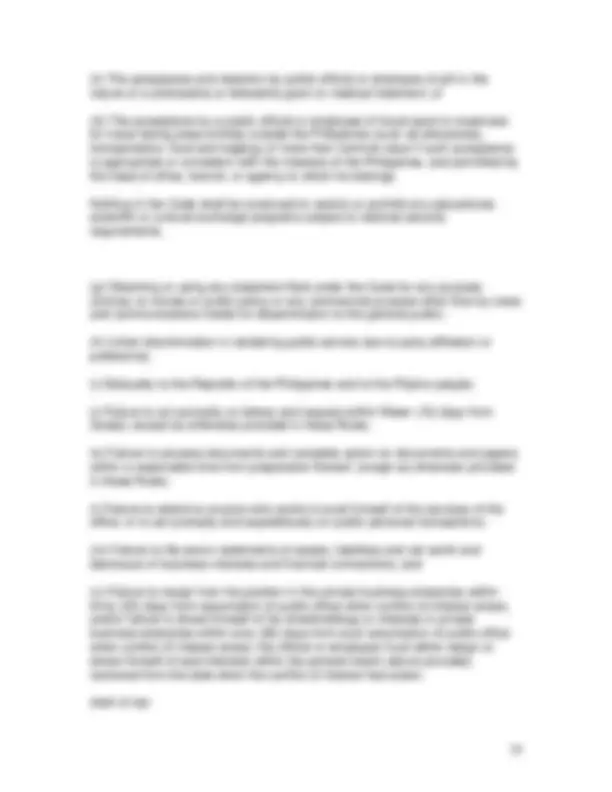
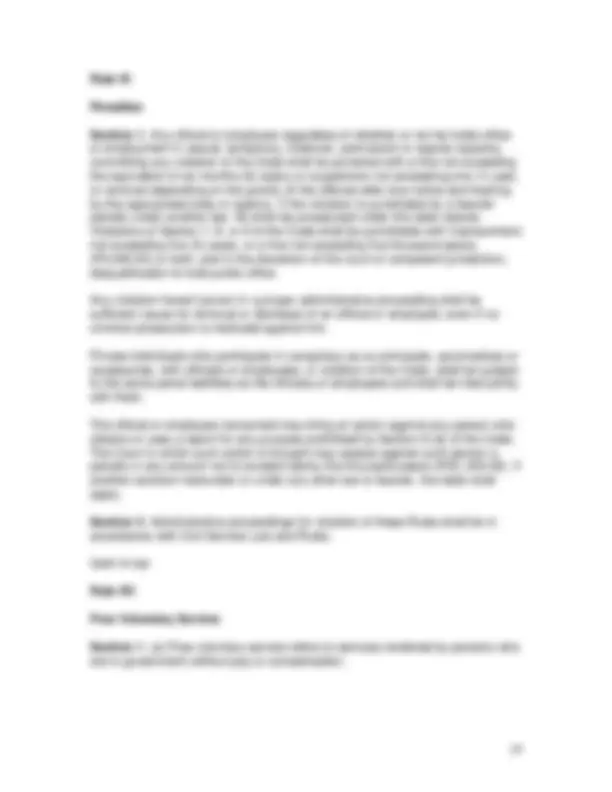
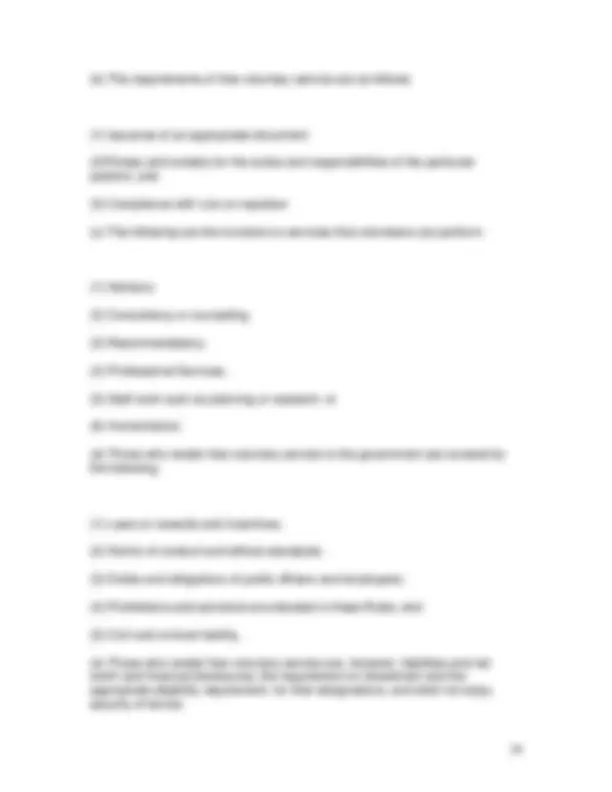
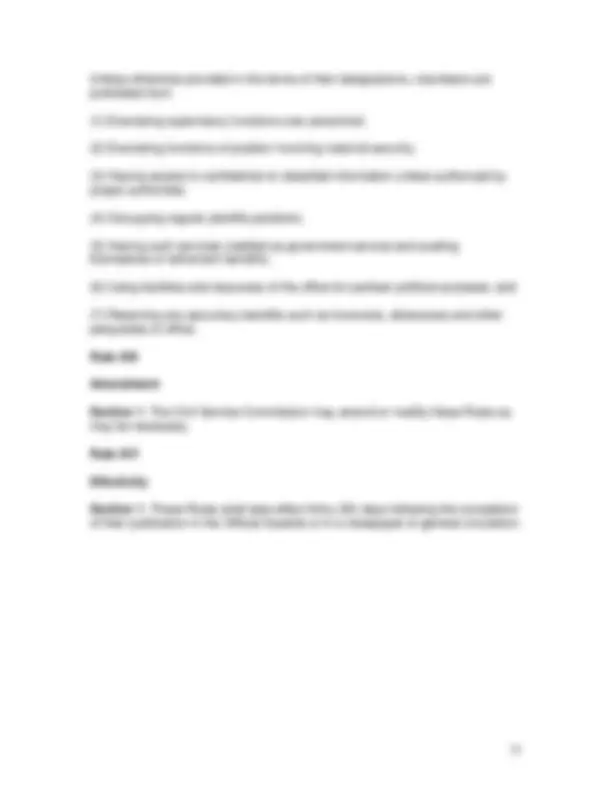


Study with the several resources on Docsity

Earn points by helping other students or get them with a premium plan


Prepare for your exams
Study with the several resources on Docsity

Earn points to download
Earn points by helping other students or get them with a premium plan
Community
Ask the community for help and clear up your study doubts
Discover the best universities in your country according to Docsity users
Free resources
Download our free guides on studying techniques, anxiety management strategies, and thesis advice from Docsity tutors
Philippines Code of Conduct and Ethical Standards for Public Officials 1989.pdf
Typology: Study Guides, Projects, Research
1 / 31

This page cannot be seen from the preview
Don't miss anything!
























Republic Act No. 6713
Code of Conduct and Ethical standards for Public Officials and Employees
http://www.tag.org.ph/phillaw/law4-RA6713.htm
Republic of the Philippines Congress of the Philippines Second Regular Session
Senate. No. 139 House No. 12069
An act establishing a code of conduct and ethical standards for public officials and employees, to uphold the time-honored principle of public office being a public trust, granting incentives and rewards for exemplary service, enumerating prohibited acts and transactions and providing penalties for violations thereof and for other purposes.
Be it enacted by the Senate and House of Representatives of the Philippines in Congress assembled:
Section 1. Title. - This Act shall be known as the “Code of Conduct and Ethical standards for Public Officials and Employees.”
Sec. 2. Declaration of Policy. - It is the policy of the State to promote a high standard of ethics in public service. Public officials and employees shall at all times be accountable to the people and shall discharge their duties with utmost responsibility, integrity, competence, and loyalty, act with patriotism and justice, lead modest lives, and uphold public interest over personal interest.
Sec. 3. Definition of Terms. - As used in this Act, the term:
(a) “Government” includes the National government, the local governments, and all other instrumentalities, agencies or branches of the Republic of the Philippines including government0owned or controlled corporations and their subsidiaries.
(b) “Public Officials” includes elective and appointive officials and employees, permanent or temporary, whether in the career or non-career service, including military and police personnel, whether or not they receive compensation, regardless of amount.
(c) “Gift” refers to a thing or a right disposed of gratuitously, or any act of liberality, in favor of another who accepts it, and shall include a simulated sale or an ostensibly onerous disposition thereof. It shall not include an unsolicited gift of nominal or insignificant value not given in anticipation of, or in exchange for, a favor from a public official or employee.
(d) “Receiving any gift” includes the act of accepting, directly or indirectly, a gift from a person other than a member of his family or relative as defined in this Act, even on the occasion of a family celebration or national festivity like Christmas, if the value of the gift is neither nominal nor insignificant, or the gift is given in anticipation of, or in exchange for, a favor.
(e) “Loan” covers both simple loan and commodatum as well as guarantees, financing arrangements or accommodations intended to ensure its approval.
(f) “Substantial stockholder” means any person who owns, directly or indirectly, shares of stock sufficient to elect a director of a corporation. This term shall also apply to the parties to a voting trust.
(g) “Family of public officials or employees” means their spouses and unmarried children under eighteen (18) years of age.
(h) “Person” includes natural and juridical persons unless the context indicates otherwise.
(i) “Conflict of interest” arises when a public official or employee is a member of a board, an officer, or a substantial stockholder of a private corporation or owned or has a substantial interest in business, and the interest of such corporation or business, or his rights or duties therein, may be opposed to or affected by the faithful performance of official duty.
(j) “Divestment” is the transfer of title or disposal of interest in property by voluntarily, completely and actually depriving or dispossessing oneself of his right or title to it in favor of a person or persons other than his spouse and relatives as defined in this Act. “Relatives” refers to any and all persons related to a public official or employee within the fourth civil degree of consanguinity or affinity, including bilas, inso and balae.
back to top
Sec. 4. Norms of Conduct of Public Officials and Employees.
(A) Every public official and employee shall observe the following as standards of personal conduct in the discharge and execution of official duties:
over the military. They shall at all time uphold the Constitution and put loyalty to country above loyalty to persons or party.
(h) Simple living. - Public officials and employees and their families shall lead modest lives appropriate to their positions and income. They shall not indulge in extravagant or ostentatious display of wealth in any form.
(B) The Civil Service Commission shall adopt positive measures to promote: (1) observance of these standards including the dissemination of information programs and workshops authorizing merit increases beyond regular progression steps, to a limited number of employees recognized by their office colleagues t be outstanding in their observance of ethical standards; and (2) continuing research and experimentation on measures which provide positive motivation to public officials and employees in raising the general level of observance of these standards.
Sec. 5. Duties of public Officials and Employees. - In the performance of their duties, all public officials and employees are under obligation to:
(a) Act promptly on letters and requests. - All public officials and employees shall, within fifteen (15) working days from receipt thereof, respond to letters telegrams or other means of communications sent by the public. The reply must contain the action taken on the request.
(b) Submit annual performance reports. - All heads or other responsible officers of offices and agencies of the government and of government-owned or controlled corporations shall, within forty-five (45) working days from the end of the year, render a performance report of the agency or office or corporation concerned. Such report shall be open and available to the public within regular office hours.
(c) Process documents and papers expeditiously. - All official papers and documents must be processed and completed within a reasonable time from the preparation thereof and must contain, as far as practicable, not more than three (3) signatories therein. In the absence of duly authorized signatories, the official next-in-rank or officer-in-charge shall sign for and in their behalf.
(d) Act immediately on the public’s personal transactions. - All public officials and employees must attend to anyone who wants to avail himself of the services of their offices and must, at all times, act promptly and expeditiously.
(e) Make documents accessible to the public. - All public documents must be made accessible to, and readily available for inspection by, the public within reasonable working hours.
back to top
Sec. 6. System of Incentives and Rewards. - A system of annual incentives and rewards is hereby established in order to motivate and inspire public servants to uphold the highest standards of ethics. For this purpose, a Committee on Awards to Outstanding Public Officials and Employees is hereby created composed of the following: Ombudsman and Chairman of the Commission on Audit, and two government employees to be appointed by the president, as members.
It shall be the task of this Committee to conduct a periodic, continuing review of the performance of public officials and employees, in all the branches and agencies of Government and establish a system of annual incentives and rewards to the end that due recognition is given to public officials and employees of outstanding merit on the basis of the standards set forth in this Act.
The conferment of awards shall take into account, among other things, the following: the years of service and the quality and consistency of performance, the obscurity of the position, the level of salary, the unique and exemplary quality of a certain achievement, and the risks of temptations inherent in the work. Incentives and rewards to government officials and employees of the year to be announced in public ceremonies honoring them may take the form of bonuses, citations, directorships in government-owned or controlled corporations, local and foreign scholarship grants, paid vacations, and the like. They shall likewise be automatically promoted to the next higher position with the commensurate salary suitable to their qualifications. In case there is no next higher position or it is not vacant, said position shall be included in the budget of the office in the next General Appropriations Act. The Committee on Awards shall adopt its own rules to govern the conduct of its activities.
Sec. 7. Prohibited Acts and Transactions. - In addition to acts and omissions of public officials and employees now prescribed in the Constitution and existing laws , the following shall constitute prohibited acts and transactions of any public official and employee3 and are hereby declared to be unlawful:
(a) Financial and material interest. - Public officials and employees shall not, directly and indirectly, have any financial or material interest in any transaction requiring the approval of their office.
(b) Outside employment and other activities related thereto. - Public officials and employees during their incumbency shall not:
(1) Own, control, manage or accept employment as officer, employee, consultant, counsel, broker, agent, trustee or nominee in any private enterprise regulated, supervised or licensed by their office unless expressly allowed by law;
(2) Engage in the private practice of their profession unless authorized by the Constitution or law, provided that such practice will not conflict or tend to conflict with their official functions; or
Sec. 8. Statements and Disclosure. - Public officials and employees have an obligation to accomplish and submit declarations under oath of, and the public has the right to know, their assets, liabilities, net worth and financial and business interest including those of their spouses and of unmarried children under eighteen (18) years of age living in their households.
(A) Statement of Assets and Liabilities and Financial Disclosure. - All public officials and employees, except those who serve in an honorary capacity, laborers and casual or temporary workers, shall file under oath their Statement of Assets, Liabilities and Net Worth and a Disclosure of Business Interests and Financial Connections and those of their spouses and unmarried children under eighteen (18) years of age living in their households.
The two documents shall contain information on the following:
(a) real property, its improvements, acquisition costs, assessed value and current fair market value;
(b) personal property and acquisition cost;
(c) all other assets such as investments, cash on hand or in banks, stocks, bonds, and the like;
(d) liabilities; and
(e) all business interests and financial connections.
The documents must be filed:
(a) within thirty (30) days after assumption of office;
(b) on or before April 30 of every year thereafter; and
(c) within thirty (30) days after separation from the service.
All public officials and employees required under this section to file the aforestated documents shall also execute, within thirty (30) days from the date of their assumption of office, the necessary authority in favor of the Ombudsman to obtain from all appropriate government agencies, including the Bureau of Internal Revenue, such documents as may show their assets, liabilities, net worth, and also their business interests and financial connections in previous years, including, if possible, the year when they first assumed any office in the Government.
Husband and wife who are both public officials or employees may file the required statements jointly or separately.
The Statements of Assets, Liabilities and Net Worth and the Disclosure of Business Interests and Financial Connections shall be filed by:
(1) Constitutional and national elective officials, with the national office of the Ombudsman;
(2) Senators and Congressmen, with the Secretaries of the Senate and the House of Representatives, respectively; Justices, with the Clerk of Court of the Supreme Court; Judges, with the court Administrator; and all national executive officials with the office of the President;
(3) Regional and local officials and employees, with the Deputy Ombudsman in their respective regions;
(4) Officers of the armed forces from the rank of colonel or naval captain, with the Office of the President, and those below said ranks, with the Deputy Ombudsman in their respective regions; and
(5) All other public officials and employees, defined in Republic Act No. 3019, as amended, with the civil Service Commission.
(B) Identification and disclosure of relatives. - It shall be the duty of every public official or employee to identify and disclose, to the best of his knowledge and information, his relatives in the Government in the form, manner and frequency prescribed by the Civil Service Commission.
(C) Accessibility of the documents.
(1) Any and all statements filed under this Act shall be made available for inspection at reasonable hours.
(2) Such statements shall be made available for copying or reproduction after ten (100 working days from the time they are filed as required by law.
(3) Any statement filed under this Act shall be available to the public for a period of ten (10) years after receipt of the statement. After such period, the statement may be destroyed unless needed in an ongoing investigation.
(D) Prohibited acts. - It shall be unlawful for any person to obtain or use any statement filed under this Act for:
(a) any purpose contrary to morals or public policy; or
(b) any commercial purpose other than by news and communications media for dissemination to the general public.
(a) Any public official or employee, regardless of whether or not he holds office or employment in a casual, temporary, holdover, permanent or regular capacity, committing any violation of this Act shall be punished with a fine not exceeding one (1) year, or removal depending on the gravity of the offense after due notice and hearing by the appropriate body of agency. If the violation is punishable by a heavier penalty under another law, he shall be prosecuted under the latter statute. Violations of Sections 7, 8, or 9 of this Act shall be punishable with imprisonment not exceeding five (5) years, or a fine not exceeding Five thousand pesos (P5, 000.00), or both, and, in the discretion of the court of competent jurisdiction, disqualification to hold public office.
(b) Any violation hereof proven in a proper administrative proceeding shall be sufficient cause for removal or dismissal of a public official or employee, even if no criminal prosecution is instituted against him.
(c) Private individuals who participate in conspiracy as co-principals, accomplices or accessories, with public officials or employees, in violation of this Act, shall be subject to the same penal liabilities as the public officials or employees and shall be tried jointly with them.
(d) The official or employee concerned may bring an action against any person who obtains or uses a report for any purpose prohibited by Section 8 (D) of this Act. The court in which such action is brought may assess against such person a penalty in any amount not to exceed Twenty-five thousand pesos (P25, 000.00). If another sanction hereunder or under any other law is heavier, the latter shall apply.
Sec. 12. Promulgation of Rules and Regulations, Administration and Enforcement of this Act. - The Civil Service Commission shall have the primary responsibility for the administration and enforcement of this Act. It shall transmit all cases for prosecution arising from violations of this Act to the proper authorities for appropriate action: Provided, however, That it may institute such administrative actions and disciplinary measures as may be warranted in accordance with law. Nothing in this provision shall be construed as a deprivation of the right of each House of Congress to discipline its Members for disorderly behavior. The Civil Service Commission is hereby authorized to promulgate rules and regulations necessary to carry out the provisions of this Act, including guidelines for individuals who render free voluntary service to the Government. The Ombudsman shall likewise take steps to protect citizens who denounce acts or omissions of public officials and employees which are in violation of this Act.
Sec. 13. Provisions for More Stringent Standards. - Nothing in this Act shall be constructed to derogate from any law, or any regulation prescribed by any body or agency, which provides for more stringent standards for its officials and employees.
Sec. 14. Appropriations. - The sum necessary for the effective implementation of this Act shall be taken from the appropriations of the Civil Service Commission. Thereafter, such as may be needed for its continued implementation shall be included in the annual General Appropriations
Act. Sec. 15. Separability Clause. - If any provision of this Act or the application of such provision of this Act or the application of such provision to any person or circumstance is declared invalid, the remainder of the Act or the application of such provision to other persons or circumstances shall not be affected by such declaration.
Sec. 16. Repealing Clause. All laws, decrees and orders or parts thereof inconsistent herewith, are deemed repealed or modified accordingly, unless the same provide for a heavier penalty.
Sec. 17. Effectivity. - This Act shall take effect after thirty (30) days following the completion of its publication in the Official Gazette or in two (2) national newspapers of general circulation.
Approved, February 20, 1989
back to top
Rules Implementing the Code of Conduct and Ethical Standards for Public Officials and Employees
Pursuant to the provisions of Section 12 of Republic Act No. 6713, otherwise known as the “Code of Conduct and Ethical Standards for Public Officials and Employees”, approved Dn February 20, 1989, and which took effect on March 25, 1989, conformably to Section 17 thereof, the following Rules are hereby adopted in order to carry out the provisions of the said Code:
Rule I
Coverage
Section 1. These Rules shall cover all officials and employees in the government, elective and appointive, permanent or temporary, whether in the career or non- career service, including military and police personnel, whether or not they receive compensation, regardless of amount.
Rule II
Interpretation
Section 4. Every department, office and agency shall conduct continuing studies and analyses of their work systems and procedures to improve delivery of public services. Towards this end, such studies and analyses shall: (1) identify systems and procedures that lead or contribute to negative bureaucratic behavior; (2) simplify rules and procedures to avoid red tape; and (3) devise or adopt systems and procedures that promote official and employee morale and satisfaction.
Each department, office or agency shall develop a service guide or its functional equivalent which shall be regularly updated and made available to the transacting public. A workflow chart showing procedures or flow of documents shall likewise be posted in conspicuous places in the department, office or agency for the information and guidance of all concerned.
Upon request, the Department of Budget and Management shall assists departments, offices and agencies in the evaluation and adoption of work systems and procedures that will institutionalize a management climate conducive to public accountability.
Section 5. Every department, office and agency shall consult the public they serve for the purpose of gathering feedback and suggestions on the efficiency, effectiveness and economy of services. They shall establish mechanisms to ensure the conduct of public consultations and hearings.
Section 6. Every department, office and agency shall continuously conduct research and experimentation on measures and adopt innovative programs which will provide motivation to officials and employees in raising the level of observance of public service ethical standards.
Section 7. every department, office and agency shall, appoint or designate a resident Ombudsman, who shall act immediately on all request for public assistance referred to him by the Ombudsman and his Deputies. He shall be held accountable for the disposition of all requests for assistance.
Section 8. Government officials shall make themselves available to their staff for consultations and dialogues.
back to top
Rule IV
Transparency of Transactions and Access to Information
Section 1. Subject to reasonable conditions prescribed by law, the State adopts and implements a policy of full public disclosure of all its transactions involving public interest.
Section 2. it is the responsibility of heads of departments, offices and agencies to establish measures and standards that will ensure transparency of and openness in public transactions in their respective offices, such as biddings, purchases, other internal transactions, including contracts, status of projects, and all other matters involving public interest.
They shall establish information systems that will inform the public of the following: (a) policies, rules, and procedures; (b) work programs, projects, and performance targets; (c) performance reports; and (d) all other documents as may hereafter be classified as public information.
Such information shall be utilized solely for the purpose of informing the public of such policies, programs and accomplishment, and not to build the public image of any official or employee or to advance his own personal interest.
Section 3. Every department, office or agency shall provide official information, records or documents to any requesting public, except if:
(a) such information, record or document must be kept secret in the interest of national defense or security or the conduct of foreign affairs.
(b) such disclosure would put the life and safety of an individual in imminent danger;
(c) the information, record or document sought falls within the concepts of established privilege or recognized exceptions as may be provided by law or settled policy or jurisprudence;
(d) such information, record or document compromises drafts or decisions, orders, rulings, policy, decisions, memoranda, etc;
(e) it would disclose information of a personal nature where disclosure would constitute a clearly unwarranted invasion of personal privacy;
(f) it would disclose investigatory records complied for law enforcement purposes, or information which if written would be contained in such records or information would (I) interfere with enforcement proceedings, (ii) deprive a person of a right to a fair trial or an impartial adjudication, (iii) disclose the identity of a confidential source and, in the case of a record compiled by a criminal law enforcement authority in the course of a criminal investigation, or by an agency conducting a lawful national security intelligence investigation, confidential information furnished only by the confidential source, or (iv) unjustifiably disclose investigative techniques and procedures; or
extend undue favors on account of their office to their relatives, whether by consanguinity or affinity, except with respect to appointments of such relatives to positions considered strictly confidential or as members of their personal staff whose terms are coterminous with theirs.
(d) Political neutrality - Officials and employees shall provide service to everyone without unfair discrimination regardless of party affiliation or preference.
(e) Responsiveness to the public - Officials and employees shall extend prompt, courteous, and adequate service to the public. Unless otherwise provided by law or when required by the public interest, officials and employees shall provide information on their policies and procedures in clear and understandable language, ensure openness of information, public consultations and hearings whenever appropriate, encourage suggestions, simplify and systematize policy, rules and procedures, avoid red tape and develop an understanding and appreciation of the socio-economic conditions prevailing in the country, especially in the depressed rural and urban areas.
(f) Nationalism and patriotism - Officials and employees shall at all times be loyal to the Republic and to the Filipino people, promote the use of locally produced goods, resources and technology and encourage appreciation and pride of country and people. They shall endeavor to maintain and defend Philippine sovereignty against foreign intrusion.
(g) Commitment to democracy - Officials and employees shall commit themselves to the democratic way of life and values, maintain the principle of public accountability and manifest by deeds the supremacy of civilian authority over the military. They shall at all times uphold the Constitution and put loyalty to country above loyalty to persons or party.
(h) Simple living - Officials and employees and their families shall lead modest lives appropriate to their positions and income. They shall not indulge in extravagant or ostentatious display of wealth in any form.
Section 2. The following criteria shall be considered in the conferment of awards:
(a) Years of service; (b) Quality and consistency of performance; (c) Obscurity of the position; (d) Level of salary; (e) Unique and exemplary quality of achievement; (f) Risk or temptation inherent in the work; and (g) Any similar circumstances or considerations in favor of the particular awardee.
Section 3. Incentives and rewards to government officials and employees of the year may take the form of any of the following, as may be determined by the Committee on Awards established under the Code:
(a) Bonuses; or (b) Citations; or (c) Directorships in government-owned or controlled corporations; or (d) Local and foreign scholarship grants; or (e) Paid vacations; and (f ) Automatic promotion to the next higher position suitable to his qualifications and with commensurate salary; provided, that if there is no next higher position or it is not vacant, said position shall be included in the next budget of the office; except when the creation of a new position will result in distortion in the organizational structure of the department, office or agency. Where there is no next higher position immediately available, a salary increase equivalent to the next higher position shall be given and incorporated in the base pay. When a new position is created, that which is vacated shall be deemed abolished.
The grants of awards shall be governed by the merit and fitness principle.
Section 4. (a) The system shall be administered by a Committee on Awards for Outstanding Public Officials and Employees composed of:
(1) Ombudsman Co-Chairman (2) Chairman CSC Co-Chairman (3) Chairman COA Member (4) Two (2) Government Members Employees to be Appointed By the President
(b) For this purpose, the Committee shall perform the following functions and responsibilities:
(1) Conduct a periodic, continuing review of performance of officials and employees in all department, offices and agencies;
(2) Establish a system of annual incentives and rewards to the end that due recognition is given to officials and employees of outstanding merit on the basis of standards set forth in Section 2, Rule V hereof;
(3) Determine the form of rewards to be granted;
(4) Formulate and adopt its own rules to govern the conduct of its activities, which shall include guidelines for evaluating nominees, the mechanism for recognizing the awardees in public ceremonies and the creation of sub- committees;
(2) Where the matter is non-routinary or the issues involved are not simple or ordinary, write a note or letter of acknowledgement, informing the interested party, petitioner or correspondent of the action to be taken or when such requests, petitions or motions can be acted upon. Where there is a need to submit additional information, requirements, or documents, the note or letter of acknowledgement shall so state, specifying a reasonable period of time within which they should be submitted, and the name of the particular official or employee in charge thereof. When all the documents or requirements have been submitted to the satisfaction of the department or office or agency concerned, the particular official or employee in charge shall inform the interested party, petitioner, or correspondent of the action to be taken and when such action or disposition can be expected, barring unforeseen circumstances.
(c) If communication is outside its jurisdiction, the official or employee must:
(1) Refer the letter, petition, telegram, or verbal request to the proper department, office or agency.
(2) Acknowledge the communication by means of a note or letter, informing the interested party, petitioner, correspondent of the action taken and attaching a copy of the letter of the letter of referral to the proper department, office or agency.
The department, office or agency to which the letter, petition, telegram or verbal request was referred for appropriate action must take action in accordance with subsection (a), pars. 1 and 2 hereof.
The period of fifteen (15) working days herein provided shall be counted from the date of receipt of the written or verbal communication by the department, office or agency concerned.
Section 4. All official papers and documents must be processed and completed within a reasonable time from the preparation thereof. Reasonable time shall be determined in accordance with the following rules:
(b) When the law or the applicable rule issued in accordance therewith prescribes a period within which a decision is to be rendered or an action taken, the same shall be followed;
(c) When the law or the applicable rule issued in accordance therewith does not prescribe a period, the head of department, office or agency shall issue rules and regulations prescribing, among other things, what is reasonable time, taking into account the following factors:
(1) Nature, simplicity or complexity of the subject matter of the official papers of documents processed by said department, office or agency.
(2) Completeness or inadequacy of requirements or of data and information necessary for decision or action;
(3) Lack of resources caused by circumstances beyond the control of the department, office or agency or official or employee concerned;
(4) Legal constraints such as restraining orders and injunctions issued by proper judicial, quasi-judicial or administrative authorities; and
(5) Fault, failure or negligence of the party concerned which renders decision or action not possible or premature; and
(6) Fortuitous events or force majeure.
Section 5. Except as otherwise provided by law or regulation, and as far as practicable, any written action or decision must contain not more than three (3) initials or signatures. In the absence of the duly authorized signatory, the official next-in-rank or officer-in-charge or the person duly authorized shall sign for and in his behalf. The head of department, office or agency shall prescribe, through and appropriate office order, the rules on the proper authority to sign in the absence of the regular signatory, as follows:
(1) If there is only one official next in rank, he shall automatically be the signatory;
(2) If there are two ore more officials next in rank, the appropriate office order shall prescribe the order of priority among the officials next in rank within the same organizational unit; or
(3) If there is no official next in rank present and available, the head of department, office or agency shall designate an officer-in-charge from among those next lower in rank in the same organizational unit.
Section 6. All public documents must be made accessible to, and readily available for inspection by, the public during working hours, except those provided in Section 3. Rule IV.
Section 7. All heads or other responsible officers of departments, offices or agencies of the government and of government-owned or controlled corporations shall, within forty five (45) working days from the end of the year, render a full and complete report of performance and accomplishments, as prescribed by existing laws and regulations.